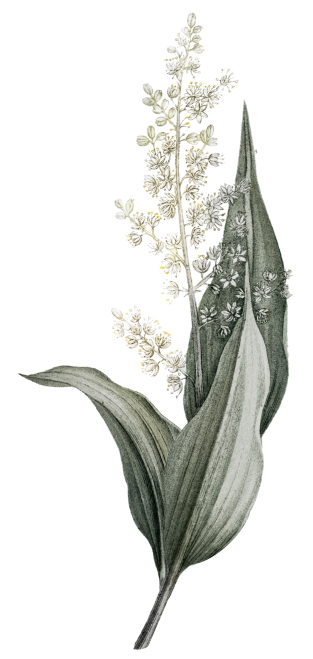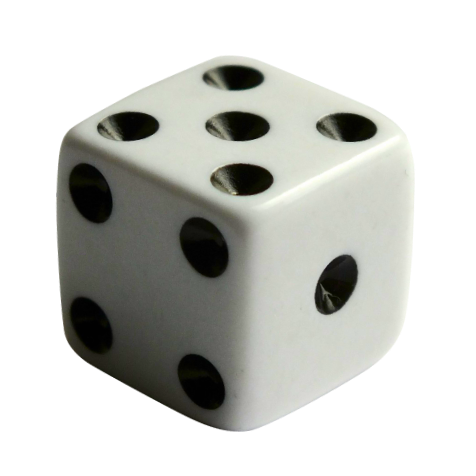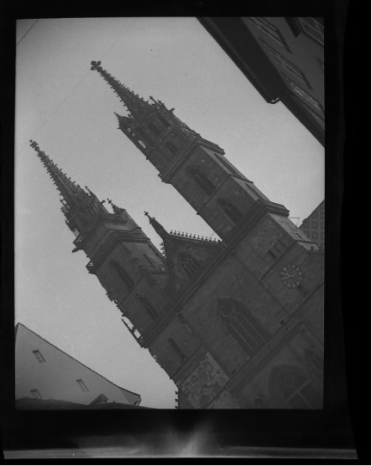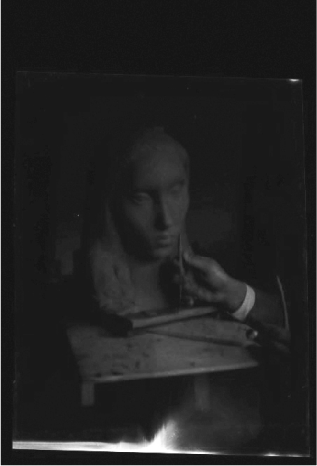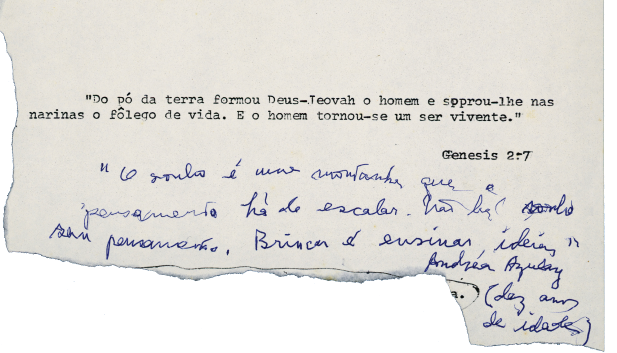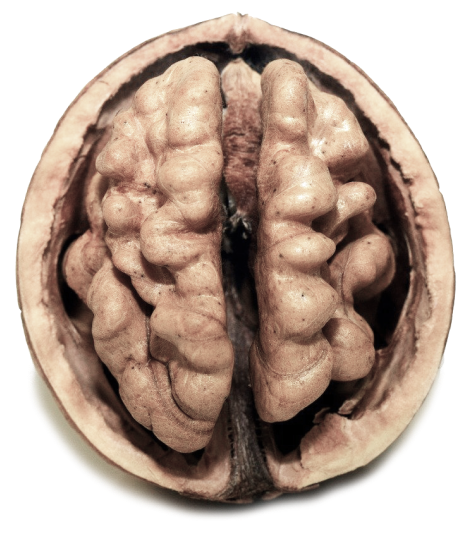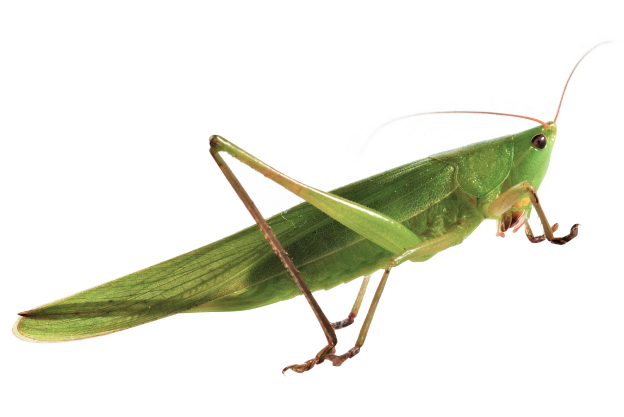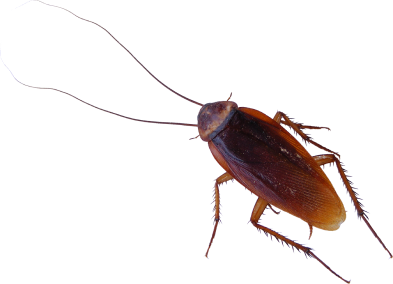An Apprenticeship, or The Book of Pleasures
The state of grace was just a small opening.
An Apprenticeship, or The Book of Pleasures
[...] there is a physical bliss which cannot be compared to anything. The body is transformed into a gift. And one feels it is a gift because one is experiencing at source the unmistakable good fortune of material existence.
“State of Grace (Extract),” in Selected Crônicas
The angel, who has entered by the window is almost human: but those long wings remind us that angels can move from one place to another without touching the ground. Those wings are quite human: they appear to be made of flesh and the angel’s face is that of a man. This is the most exquisite and harrowing truth the world has to offer. All human beings experience annunciation. With pregnant souls we raise our hands to our throats with surprise and anguish. As if each of us had learned at a given moment in life that we have a mission to fulfil. That mission is by no means easy: each of us is responsible for the entire world.
"Annunciation," in Selected Crônicas
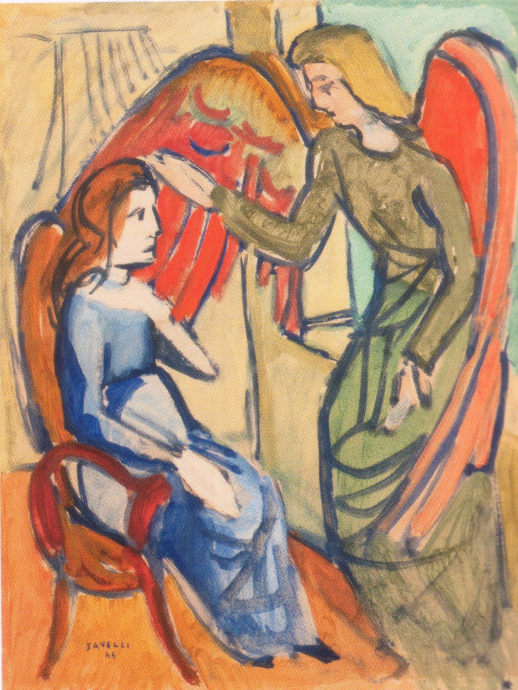
Annunciation. Oil on paper, by Angelo Savelli, 1944
José Tolentino Mendonça, in A mística do instante (The Mystique of the Instant):
With Creation (that is, since the beginning of beginnings) a fascinating and unbreakable alliance was established: that which unites divine spirituality and terrestrial vitality. For where will we better experience, from now on, the Spirit of God, if not in the extremes of the flesh made living? Where will we enter into contact with its breath if not through the clay? Where will we open ourselves to its tangible passing if not through the senses?

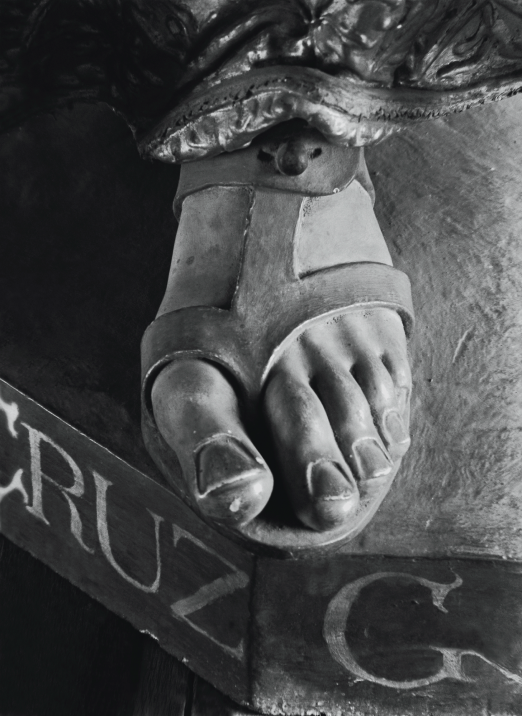
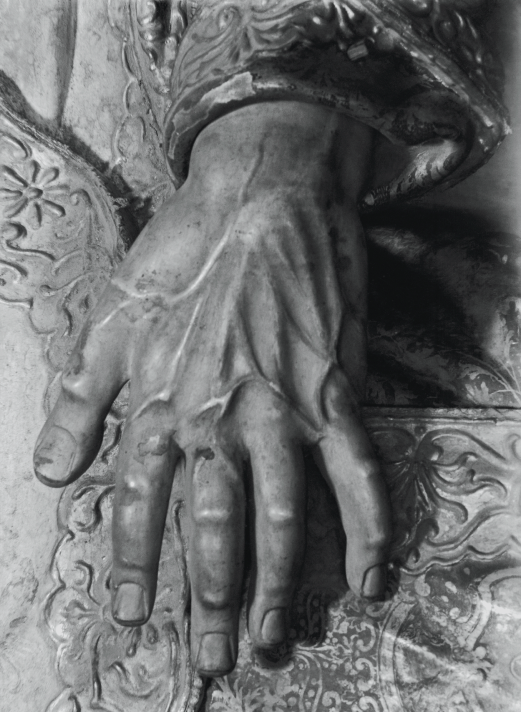
Saint John of the Cross. Photo by Horacio Coppola, 1945


Saint John of the Cross. Photo by Horacio Coppola, 1945
Hear me, hear my silence. What I say is never what I say but instead something else. When I say "abundant waters" I'm speaking of the force of body in the waters of the world. It captures that other thing that I'm really saying because I myself cannot. Read the energy that is in my silence. Ah I fear God and his silence.
Água Viva
The nature of beings and of things – is God?
Água Viva
An Apprenticeship, or The Book of Pleasures
Nature is like a pulsating heart.
An Apprenticeship, or The Book of Pleasures
Nature is enveloping: it entangles me entirely and is sexually alive (...).
Água viva
Photos by Marcel Gautherot
Nature is enveloping: it entangles me entirely and is sexually alive (...).
Água Viva
Photos by Marcel Gautherot
The erotic impulse of the entrails is linked to the eroticism of the trees' twisted roots. It's the rooted force of desire. My truculence. Monstrous viscera and hot lavas of burning mud.
Extract from “Screaming Object,” from which the book Água Viva originated.
It so happens that everything that lives and that we call "natural" is, in the last instance, supernatural.
"Literature and Magic," in Outros escritos (Other Writings)
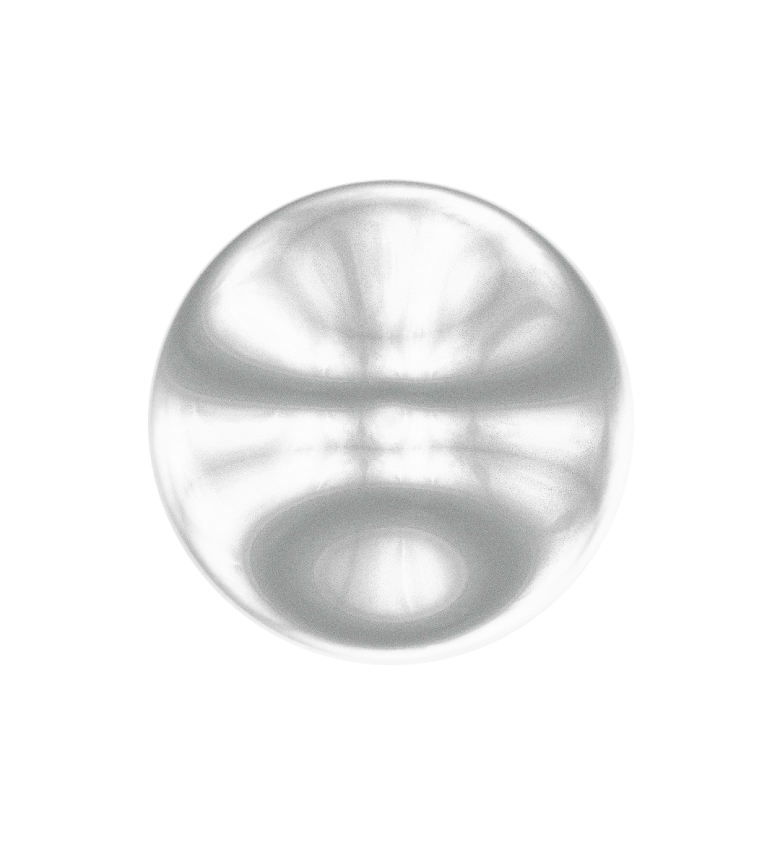
Those who have never stolen would not understand. And those who have never stolen roses would never be capable of understanding me. For when I was a little girl, I used to steal roses.
“A Hundred Year's Pardon,” in Selected Crônicas
Clarice Lispector by Maureen Bisilliat, 1969
I know that my gaze must be that of a primitive person surrendered completely to the world (...).
Água Viva

Mango Trees in the Botanical Gardens. Photo by Marc Ferrez, circa 1880
Human beings come up against obstacles which do not affect the lives of animals, such as reasoning, logic and understanding. While animals enjoy the splendour of that which is direct and proceeds directly.
“State of Grace (Extract,)” in Selected Crônicas
Água viva
Not having been born an animal is a secret nostalgia of mine.
Água Viva
I don't humanize animals because it's an offense –
you must respect their nature – I am the one who animalizes myself.
Água Viva
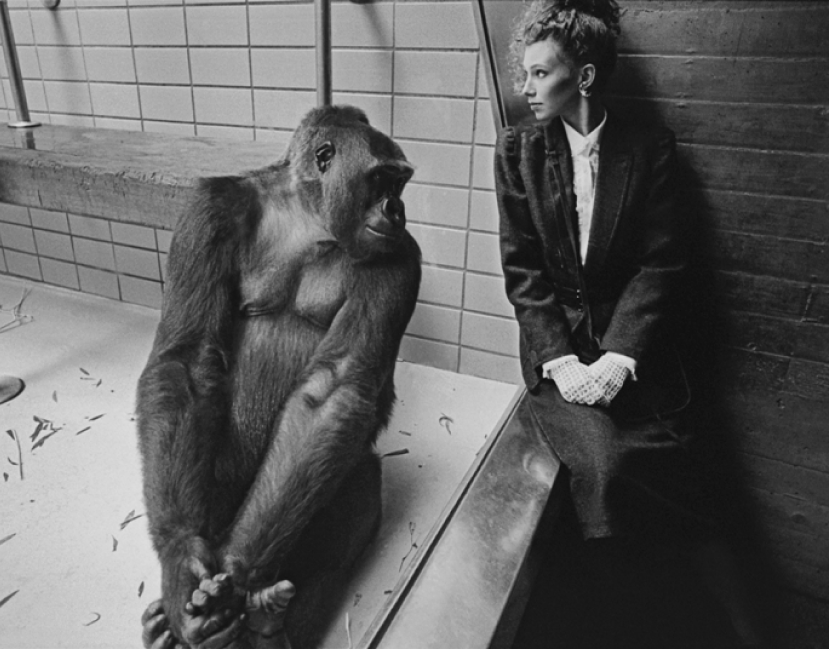
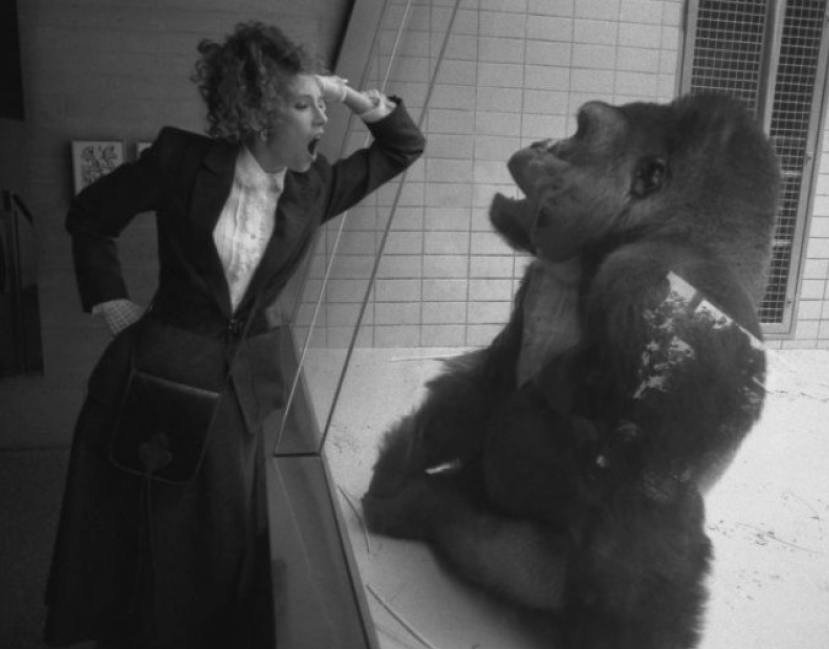
Model with a Gorilla. Photos by Otto Stupakoff, 1976
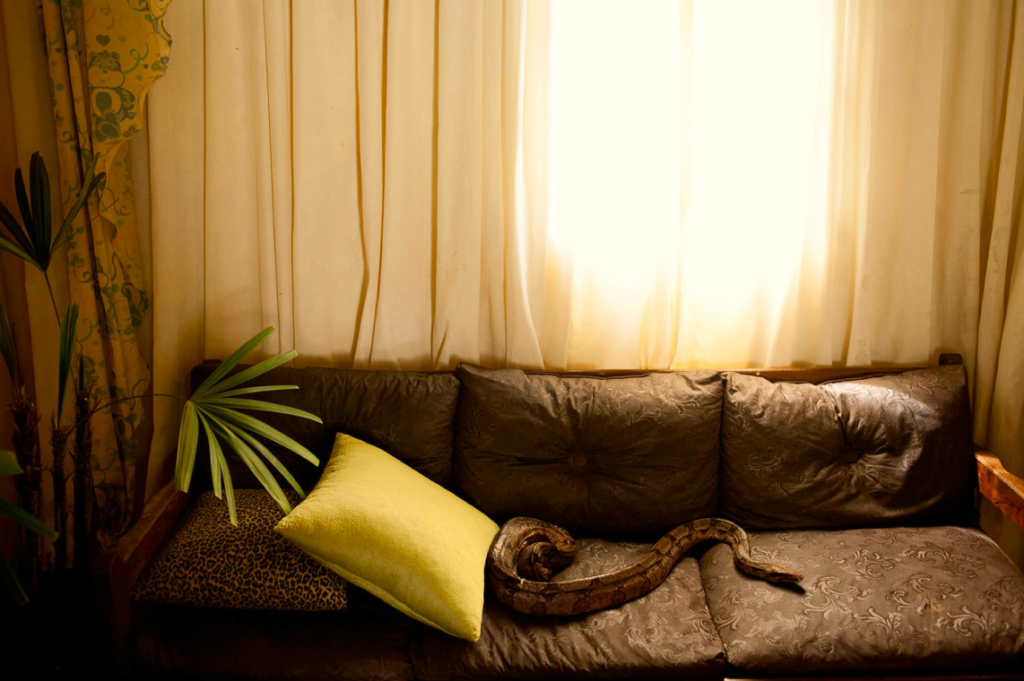
Zoo Series. Photo by João Castilho, 2017
She felt a perfect animal inside her, full of
contradictions, of selfishness and vitality.
Near to the Wild Heart
Only those who are afraid of their own animality don't like animals. I love them. I had a monkey in my childhood. I get along very well with animals. I can perfectly understand a chicken, that is, I don’t know how the intimate life of a chicken is. You can't imagine how well I get along with animals. Maybe because I'm a Sagitarius, I'm half animal.
Interview with O Globo, April 29, 1976
Any cat, any dog is worth more than literature.
“The Man Who Showed Up,” in The Complete Stories
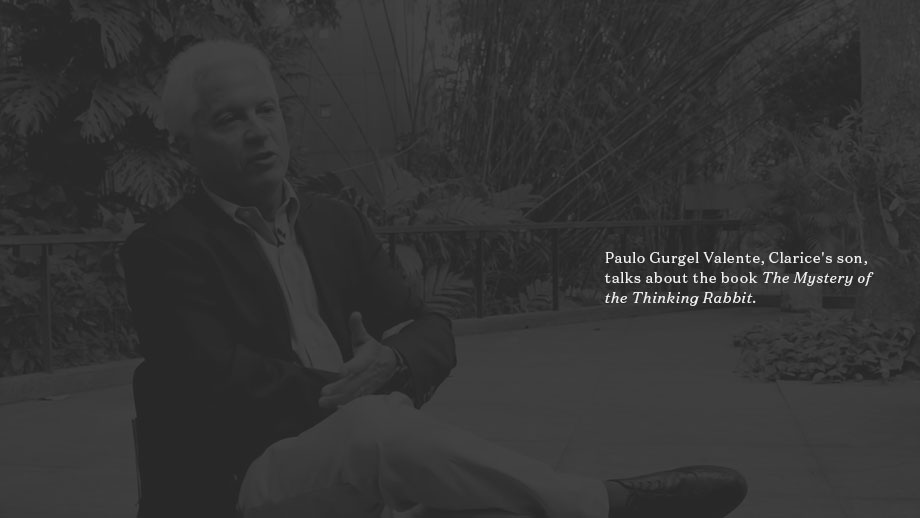
Play Video
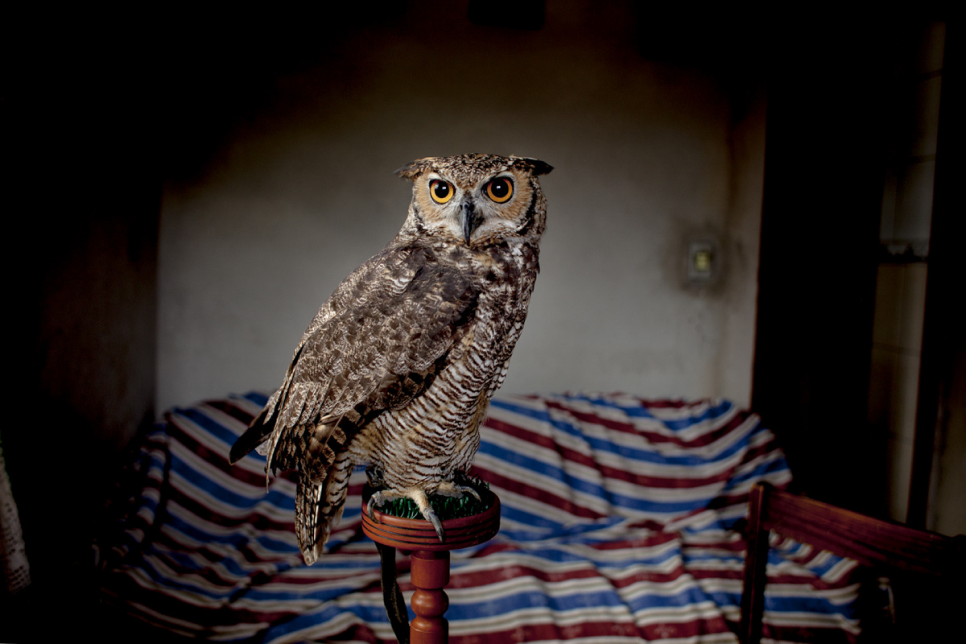
Zoo Series. Photo by João Castilho, 2017
Carlos Mendes de Sousa, in
Clarice Lispector – figuras da escrita (Clarice Lispector: Figures of Writing):
The animal begins by being glimpsed as one of the most obvious and indispensable signs in a characterization of Clarice Lispector's writing, whose foundation we could find in the egg, a founding figure. To speak of Clarice is to speak of the cockroach or the chicken or the horse, and one could go on, continuously, with an extensive roster: the dog, the buffalo, a marmoset, a grasshopper, etc. However, the three former animals constitute a triad sustained by an extraordinary, obsessive presence.
It was a face without a contour. The antennae stuck out in whiskers on either side of its mouth. Its brown mouth was well-drawn. The long and slender whiskers were moving slow and dry. Its black faceted eyes were looking. It was cockroach as old as a fossilized fish. It was a cockroach as old as salamanders and chimeras and griffins and leviathans. It was as ancient as a legend. I looked at its mouth: there was the real mouth.
The Passion According to G.H.
It was a face without a contour. The antennae stuck out in whiskers on either side of its mouth. Its brown mouth was well-drawn. The long and slender whiskers were moving slow and dry. Its black faceted eyes were looking. It was cockroach as old as a fossilized fish. It was a cockroach as old as salamanders and chimeras and griffins and leviathans. It was as ancient as a legend. I looked at its mouth: there was the real mouth.
The Passion According to G.H.
Standing in the bathroom she was as anonymous as a chicken.
“In Search of a Dignity,” in Complete Stories
Standing in
the bathroom she was
as anonymous as
a chicken.
“In Search of a Dignity,” in Complete Stories
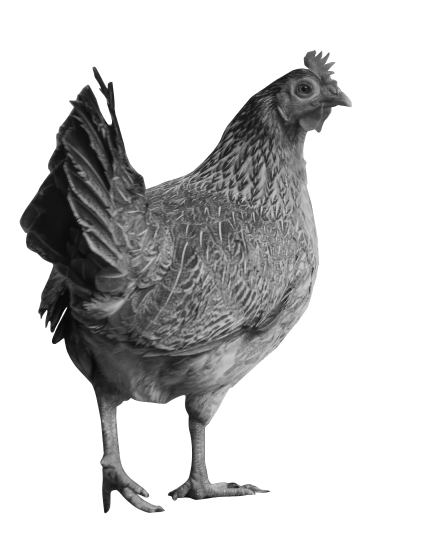
The visible recurrence of the chickens' world is intentionally eye-catching. They emerge, above all, due to the egg, and this is clearly noticeable; however, they emerge as they are, and the scenario is not sugar-coated or mythicized in a primordial scene of chickens with golden eggs; they are chickens in all their stupidity, in the machinic gestures of their secular heritage.
Carlos Mendes de Sousa, in Clarice Lispector – Figuras da escrita (Clarice Lispector: Figures of Writing)
:

Does the horse represent the beautiful and liberated animality of the human being? Does the human already contain the best of the horse? Then I renounce being a horse and in glory I'll go over to my humanity. The horse shows me what I am.
“Dry Sketch of Horses,” in Complete Stories
Já vi cavalos soltos no pasto onde de noite o cavalo branco – rei da natureza – lançava para o alto ar seu longo relincho de glória. Já tive perfeitas relações com eles. Lembro-me de mim de pé com a mesma altivez do cavalo e a passar a mão pelo seu pelo nu. Pela sua crina agreste. Eu me sentia assim: a mulher e o cavalo.
Água viva
Do you know who I am? I'm a dog named Ulisses and my owner is Clarice. I keep barking at Clarice, and she — who understands the meaning of my barks — is writing what I'm telling you.
Almost True
The Passion According to G.H.
(...) I reply whenever someone says: I.
The Passion According to G.H.
The Bible, Exodus 3:11-14:
But Moses said to God, “Who am I that I should go to Pharaoh and bring the Israelites out of Egypt?” And God said, “I will be with you. And this will be the sign to you that it is I who have sent you: When you have brought the people out of Egypt, you will worship God on this mountain.” Moses said to God, “Suppose I go to the Israelites and say to them, ‘The God of your fathers has sent me to you,’ and they ask me, ‘What is his name?’ Then what shall I tell them?” God said to Moses, “I am who I am. This is what you are to say to the Israelites: ‘I am has sent me to you.’”
They gave me
a name and
alienated me
from myself.
A Breath of Life
José Miguel Wisnik, in “Ficção ou não” (Fiction or Not):
“I” is the last structural word that a child learns to handle and the first that, in certain conditions, an aphasic person loses: it is the very crossroad at which one decides the belonging of subjects to the field of language.
Do you ever suddenly find it strange to be yourself?
A Breath of Life
Portrait of Clarice. Oil over cardboard, by Giorgio de Chirico, 1945
The I who appears in this book is not I. It is not autobiographical, you all know nothing of me. I never have told you and never shall tell you who I am. I am all of yourselves.
A Breath of Life
Joana Lídia Virgínia Lucrécia G.H. Janair Lóri Macabéa Sofia Glória Madame Carlota Angela Pralini Pequena flor Vitória Ermelinda Luísa
One of my sons says to me: "Why is it that you sometimes write about personal issues?" I replied that, in the first place, I've never really touched on my personal issues, I'm a rather secretive person. And even with my friends I only go so far. It's fatal, in a newspaper column that’s published every Saturday, to end up inadvertently commenting on how our daily lives and our strange life affect us.
“Vietcong,” in Todas as crônicas (All the Chronicles)
Thinking is an act. Feeling is a fact. Put the two together — I am the one writing what I am writing. God is the world. Truth is always an interior and inexplicable contact. My truest life is unrecognizable, extremely interior and there is not a single word that defines it.
The Hour of the Star
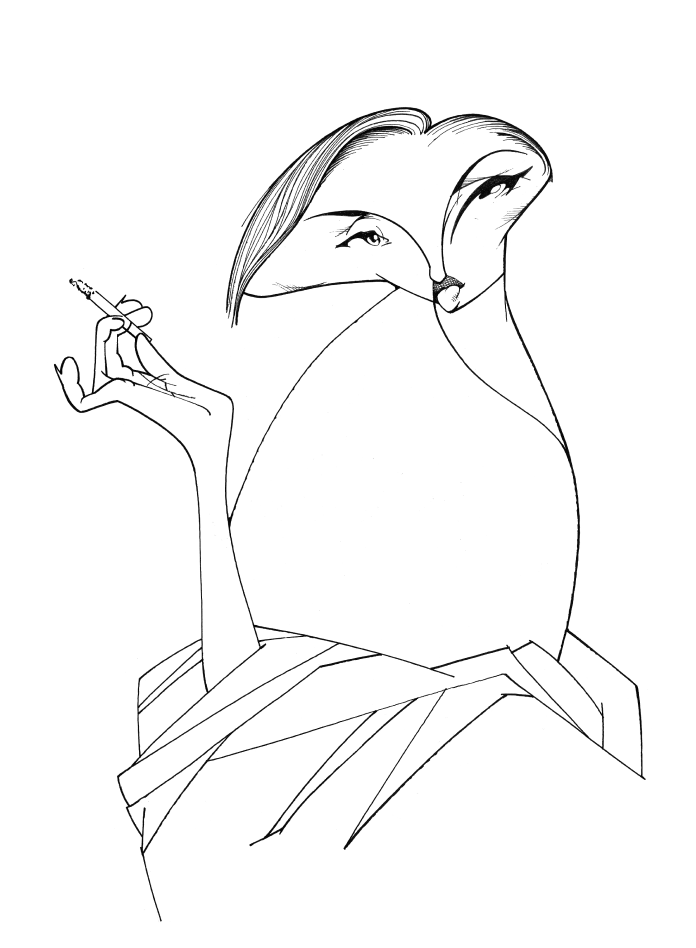
Clarice Lispector by Cássio Loredano.
Dying will be the end of something brilliant: dying will be one of the most important acts of my life. I'm afraid of dying: I don't know what nebulae and Milky Ways await me. I want to die giving emphasis to life and death. I only ask one thing: when my time comes, I’d like to have a loved one by my side to hold my hand. Then I won't be scared, and I’ll have company when I pass to the great beyond.
“The Three Experiences,” in Todas as crônicas (All the Chronicles)

Clarice
issued from some mystery and departed for another.
We cannot fathom its essence.
The mystery was not essential,
it was Clarice travelling inside.
...............................
Carlos Drummond de Andrade, in "Vision of Clarice Lispector"
